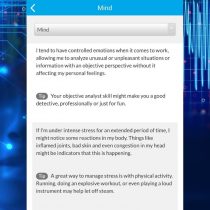

Where are you most comfortable? Do you like to go out a lot and meet new people or do you prefer the company of a good book and a hot cup of tea? Do you work well when you have music pumping to motivate you or do you need absolute silence to concentrate? Do you like to hit it hard at the gym or would you rather go for a nice relaxing walk on the beach?
Maybe you like a combination of these things at different times. It doesn’t matter what kind of environment you are most comfortable in; what matters is that you are aware of what works for you and what doesn’t. Because being in an environment that fits your personality is healthy. On the flip side, forcing yourself to spend time in environments that make you uncomfortable can be detrimental to your health.
Why your environment is vital to your health.
Your satisfaction in life is more greatly determined by negative or positive emotions than by personality itself. That means that you may be born with a cheerful disposition or a proactive approach to problem solving, but that doesn’t mean you are born satisfied and happy. You may be born with certain personality traits, but happiness comes from recognising those traits and being true to them. What truly makes all of us happy is feeling accepted as who we are naturally – by others but also, and most importantly, by ourselves.
When you are in an environment that makes you feel good, positively reinforces your natural ways, and where you feel like you are successfully using your natural talents and abilities, things flow more easily and you are showered by positive emotions.

The contrary can also happen. Feeling a mismatch with the environment, where your natural ways, behaviors, thoughts and talents are not appreciated or even worse, rejected, can cause depression.
You do you!
If you have an outgoing personality and one of your natural talents is connecting people and making them feel at ease, then sending time in social environments where you can connect with and meet new people will make you feel good about yourself and will enforce positive emotions. Spending day in and day out at home by yourself, on the other hand, could leave you feeling unfulfilled and even depressed. It is therefore important to find an environment (be it social, vocational or other) that matches who you truly are, rather than trying to fit into a role you don’t feel you belong in.
It’s OK to say ‘no’.
To a certain extent, we instinctively know which environments are best for us and we gravitate towards them. For example, you may know that you need quiet to do work which requires a lot of concentration so you come into work early and do it before anyone else comes in. Though you may naturally tend to seek environments, jobs, social circles and hobbies that suit your personality style, there are many situations in which you may feel obligated to partake.

A party that your friend invites you to that just isn’t your thing, for example, or the yoga class that your partner wants to attend together when you would much rather thrash it out on the cross trainer. It may feel like you need to say ‘yes’ to these things – after all you want to make your loved ones happy – but consider what it means for your health to spend time in an environment that doesn’t match your personality.
When the environment you’re in doesn’t fit your natural personality, it can cause feelings of neuroticism, lower self-esteem, depression and frustration which are all psychological and emotional conditions that can even have a physical effect on the body. That’s some pretty serious stuff!
Of course, there will be times when you will need to compromise – that’s life – but know that’s it’s OK to sometimes say ‘no’. After all, your loved ones want to make you happy too and will accept you if you explain to them why that party or that yoga class just isn’t for you.
You can learn exactly which environments are best for you right now by checking out ph360. Spending more time in environments that are true to your personality can have a massively positive impact on your overall health and wellbeing. Try it and see!
Refernces
Roberts, Brent W., and Richard W. Robins. “Person‐Environment fit and its implications for personality development: A longitudinal study.” Journal of Personality 72.1 (2004): 89-110.
Rauthmann, John F., et al. “Personality-driven situation experience, contact, and construal: How people’s personality traits predict characteristics of their situations in daily life.” Journal of Research in Personality 55 (2015): 98-111.
Kristof-Brown, Amy, and Russell P. Guay. “Person-environment fit.”. Zedeck, Sheldon (Ed), APA handbook of industrial and organizational psychology, Vol 3: Maintaining, expanding, and contracting the organization.(2011) Washington, DC, US: American Psychological Association, viii
Schimmack, Ulrich, et al. “Personality and life satisfaction: A facet-level analysis.” Personality and social psychology bulletin 30.8 (2004): 1062-1075.
Eisenberger, Naomi I., and Matthew D. Lieberman. “Why rejection hurts: a common neural alarm system for physical and social pain.” Trends in cognitive sciences 8.7 (2004): 294-300.
Mendes, Wendy Berry, et al. “How attributional ambiguity shapes physiological and emotional responses to social rejection and acceptance.” Journal of personality and social psychology 94.2 (2008): 278.
Related Posts
Also in Health

Health
Your Ideal Workout: How to Make Exercise Feel Like Play
Ever notice that professional athletes’ bodies are specifically matched to their needs? It’s no coincidence that basketball players are tall, gymnasts are petite, and football players are broad. In the same way, your body is…
























